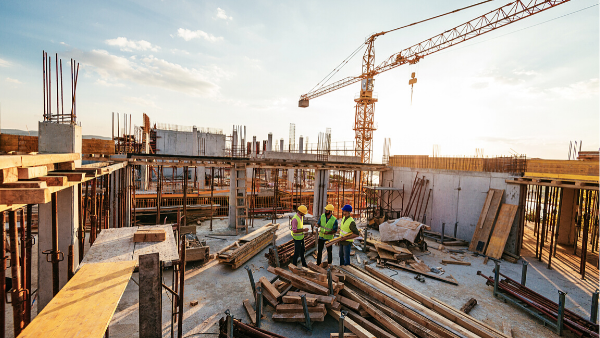Authors
As the Coronavirus pandemic continues to spread across the globe, businesses are being required to address the burning (and often existential) issue of what measures to take during the forthcoming period of uncertainty. In his announcement on 23 March 2020, the Prime Minister introduced stricter measures in an attempt to slow the spread of the virus including only travelling to and from work where “absolutely necessary”.[1]
This announcement has left unanswered questions for those in the construction industry and the Government is now facing pressure to act to protect construction workers against the Coronavirus risk.[2] This article examines the steps to consider in addressing both the health and economic challenges posed by COVID-19.
Health and safety
In an attempt to address the confusion surrounding the Coronavirus measures, the Cabinet Office Minister, Michael Gove, explained on 24 March 2020 that construction operatives could continue to work, so long as they practised “safe social distancing measures”.
It is difficult to reconcile this rather unusual suggestion with the practicalities of working on-site. Heavy tools and equipment, for example, need to be handled carefully to avoid injuries and remaining two metres apart simply increases the risks of working on building sites. Unless realistic measures are introduced, projects across the country are likely to reach a standstill to combat the virus. Indeed, two of the UK’s major house builders, Bellway plc and Persimmon plc, announced on 25 March 2020 that they would be shutting down their sites following the Coronavirus lockdown measures.
Practical suggestions
If businesses in the industry have not already done so, now would be a good opportunity to review, and perhaps update, their own health and safety policies. The health and safety of the workforce is of the utmost importance and COVID-19 is a complex virus which will take many months to overcome.
Whilst the CDM Regulations ensure compliance with health and safety procedures, businesses should be encouraged to ensure that appropriate procedures are put in place which will enable work on-site to continue if infection is reported locally. This is the case even if the industry shuts down and subsequently re-opens because the risk of infection remains particularly high given the large number of people working on building sites.
If the industry does shut down, businesses should consider appointing a designated group of individuals to monitor the development of the virus and ensure that they keep up-to-date with the Government’s advice and recommendations. In the coming months, this may help businesses plan a return to work.
The Common Law position – Frustration
Delays in practical completion, increases in the cost of a project and possible changes to the scope of works are just some of the possible impacts of Coronavirus. In circumstances where events outside the control of both parties result in the contract becoming “radically different” to what was originally contemplated, the only directly applicable doctrine in English Law upon which a contract may be discharged is Frustration.[3]
An event which “frustrates” a contract results in it becoming commercially or physically impossible to perform. Historically, the doctrine has been narrowly defined when applied in construction disputes. The courts’ approach towards such arguments is that the parties are strictly liable for the performance of their contractual positions and there is a particularly high threshold to meet before a contract is considered to be frustrated. Parties are more likely to succeed in securing a remedy under a carefully drafted force majeure clause. (For more information on Frustration and force majeure in the context of Coronavirus, see also: Coronavirus and Property Development)
Contractual remedies: Force Majeure
Force majeure is a Civil Law concept and will only apply where expressly provided for in contracts. It refers to a “superior force” outside of the parties’ control that commonly allows a party to suspend (or terminate) the performance of its obligations because it is effectively prevented from fulfilling them. Both JCT Contracts and NEC Contracts deal with force majeure-type events differently.
JCT contracts: Relevant Events and termination
Important distinctions
A Relevant Event is an event which causes a delay to the completion date of a project. Readers should not confuse Relevant Events (which entitle the contractor to an extension of time) with Relevant Matters (which entitle the contractor to claim for loss and expenses). Force majeure is not a Relevant Matter and so no loss and expense is payable to the contractor.
Extension of Time
Clause 2.26.14 of JCT Design and Build 2016 Edition refers to force majeure as one of the Relevant Events entitling the contractor to a fair and reasonable extension of time for completion of the works (albeit no entitlement to additional payment). No further definition of what constitutes a force majeure event is however provided and there is room for debate as to whether the current situation falls within the ambit.
Termination
JCT contracts also provide suspension and termination rights. In particular, clause 8.11.1 of the JCT Design and Build contract allows either party to terminate the contractor’s employment under the building contract as a result of force majeure. The right of termination is not a unilateral right, however. Work must have been suspended for the relevant period stated in the Contract Particulars beforehand; the JCT default position being two months.
Following the period of suspension, the party wishing to terminate should serve notice on the other stating that, unless suspension ceases within seven days after receipt of that notice, he may terminate the contractor’s employment. If the suspension continues beyond seven days, a second notice should be served and termination of the contractor’s employment takes effect on receipt of this second notice.
Considerations
Parties should therefore exercise caution and adhere to notice requirements when asserting that a force majeure event has occurred. The burden of proof is on the party seeking to rely on the force majeure clause and any tribunal is likely to pay particular attention to a party’s exercise of termination rights and whether this is justifiable.
This is particularly relevant given the contractual obligations on contractors in connection with extensions of time. Clause 6.1 of the JCT Design and Build Contract, for example, requires a contractor to “constantly use his best endeavours to prevent delay in the progress of the Works or any Section […] and to prevent the completion of the Works or Section being delayed or further delayed beyond the relevant Completion Date”.
Other Relevant Events
As outlined above, the Government continues to face mounting pressure to protect workers in the construction industry. Depending on the Government’s response, clause 2.26.12 of the JCT Design and Build Contract may provide relief to contractors.
A Relevant Event under this clause is defined as the “exercise … by the UK Government or any Local or Public Authority of any statutory power that is not occasioned by a default of the Contractor … but which directly affects the execution of the Works“.
The wording is clear, however. The measures/restrictions must be implemented (which have a direct effect on carrying out construction works) before this clause can be relied upon. At the present time, contractors may struggle to rely on this clause if there is a shortage of staff on-site because the Government has advised that construction workers can continue their operations. If, however, the Government responds to the pressure by extending its work-from-home measures to the construction workforce, or orders the closure of all construction sites, contractors may succeed in arguing that a Relevant Event has occurred and may be able to claim for an extension of time (but not loss and expense).
A further example would include if the employer was taken ill after contracting Coronavirus and was unable to provide instructions to the contractor. A contractor may be able to argue that is an impediment and/or prevention by the employer amounting to a Relevant Event under clause 2.26.6 and also a Relevant Matter under clause 4.21.5 of the of JCT Design and Build contract. Under these circumstances, a successful contractor would be entitled to both an extension of time and loss and expense.
NEC Contracts: Compensation Events and Termination
Compensation Events
The concept of force majeure is not recognised under either the NEC 3 or NEC4 contract. Instead, “compensation events” operate to grant the contractor additional time and money. There are a number of compensation events which could be triggered as a result of Coronavirus, such as the failure of the employer or other contractors on site to carry out work within the accepted programme, resulting in a compensation event under clause 60.1(5). Coronavirus is highly likely to result in clause 60.1(19), concerning unforeseeable events, being invoked. To qualify, the event must be one which prevents the contractor completing by the completion date shown in the accepted programme, or completing the works at all, and:
- is an event which neither party could prevent;
- is an event which an experienced contractor would have judged at the Contract Date to have such a small chance of occurring that it would have been unreasonable for him to have allowed for it; and
- is not one of the compensation events specified elsewhere in the contract.
Clause 60.1 is supplemented by clause 61.3 which provides that if the contractor does not notify a compensation event within 8 weeks of becoming aware of the event, he is not entitled to a change in the prices, the completion date or a key date. Furthermore, clause 15.1, requires contractors to give an early warning notice if they become aware of “any matter” which could affect the total of the prices, could delay completion or a key date, or impair the performance of the works in use.
The requirements of clause 61.3 and 15.1 should not be taken lightly by contractors as the first reported case of the virus in the UK was in February 2020. As we approach the end of March 2020, the difficulty of claiming that an early warning notice was given increases with the more time that passes.
It will, of course, be easier for contractors to rely upon clause 60.1(19) if they were engaged under NEC contracts before the outbreak of the virus. As with JCT contracts, however, COVID-19 as a compensation event is yet to be tested by the courts. This suite of contracts is based on the principle of mutual trust and cooperation and the courts may look to see if a party’s conduct in response to the virus is consistent with those doctrines.
Given the extent of the Government measures so far in response to the virus, and the risk of the industry shutting down, factor (a) is unlikely to be a point of contention, but factor (b) may cause problems. If a contractor, who is still negotiating their contract during the Coronavirus pandemic, wishes to rely on clause 60.1(19) for money or an extension of time because of the impacts of Coronavirus in the future, he would need to argue that, at the time of signing the contract, the likelihood of Coronavirus having an impact on the works was so low that it was not necessary to allow for it. The courts are unlikely to entertain such an argument given the scale of the pandemic so far.
Termination
Under NEC Contracts, it is only employers that may terminate the contract under clause 91.7 R21 where a force majeure-type event occurs. Again the event must stop the Contractor completing the works, or stop the Contractor completing by the date in the accepted programme and be forecast to delay completion by at least 13 weeks, and it must also meet the criteria set out in points (a) and (b) above which applied to clause 60.1(19).
However, under clause 91.6, where the project manager orders work to cease and no instruction is given to re-start work within 13 weeks then, if the reason for the instruction was employer default (R19) or “any other reason” (R20), then the contractor may terminate the contract. We submit that if such an instruction is issued due to the effects of Coronavirus then that would be capable of being “any other reason”. Any extension of the lockdown to construction sites is, we think, likely to be held by the courts to be of suspensory effect, so this would not necessarily amount to a situation where “…the Parties have been released under the law from further performance of the whole of the contract (R17)”, whereupon either party may terminate the contract under clause 91.5.
Contractual Remedies: Bespoke clauses
For contracts that have not yet been entered into, parties may wish to consider including bespoke clauses or amendments to existing clauses that specifically account for the impacts and effects of Coronavirus. It is not recommended that parties carry out their own amendments to their contracts; rather, parties should discuss their concerns with their lawyers who can then tailor the drafting to the contract and nature of work on-site. Whilst the courts will do what they can to give effect to what the parties objectively agree, the major risk for parties without expert help in drafting relief clauses too widely (or too narrowly) is that it could lead to unexpected relief (or denial of anticipated relief).
Conclusion
As the country enters into a period of uncertainty, the Government is likely to release further information concerning the future of the construction industry in the short term.
In the meantime, parties should take heed of the advice above and review the terms of their contracts with lawyers and consider drafting in provisions to cover events such as this occurring in the future.
Now is also an opportunity to check the terms of any insurance documentation and/or make enquiries as to whether the impacts to business operations as result of Coronavirus are covered.
If you would like to discuss any of the issues raised in this article, or have other concerns about the impact of Coronavirus, please contact Michelmores’ Construction & Engineering team.
CORONAVIRUS STOP PRESS – Click here to keep up-to-date with all of our latest articles.
This article is for information purposes only and is not a substitute for legal advice and should not be relied upon as such. Please contact our specialist lawyers to discuss any issues you are facing.
[1] BBC News: Coronavirus: Strict new curbs on life in UK announced by PM – https://www.bbc.co.uk/news/uk-52012432
[2] BBC News: Coronavirus: Construction workers fear for their safety – https://www.bbc.co.uk/news/business-52017520
[3] See, for example, Davis Contractors v Fareham Urban DC [1956] UKHL 3 (19 April 1956)
Authors
Michelmores Property Awards
Celebrating the best of property, development and construction in the South West The Michelmores Property Awards celebrate the best property, development and construction projects in...



